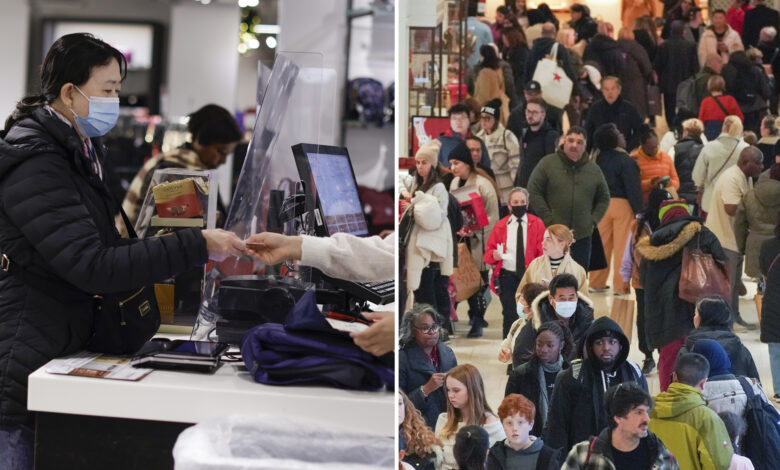Black Friday spending hits record online, shoppers avoid crowds

Black Friday bargain hunters broke online shopping records, with nearly $10 billion spent online as consumers desperate for deals largely opted to avoid chaotic crowds.
Shoppers spent a record $9.8 billion online on Friday, up from $9.12 billion the day after Thanksgiving 2022, according to Adobe Analytics, which analyzes e-commerce transactions.
Electronic products such as smart watches, televisions and Bluetooth headphones were popular items.
Other favorites included Barbie Fashionistas dolls, Mini Brands toys, cordless and robot vacuum cleaners, kitchen utensils, skin care and coffee makers.
While consumers are breaking records, they are not looking to go broke with fears of inflation at a 12-year high and average goods and services still much more expensive than in recent years.
Last week, 72% more shoppers used flexible “buy now, pay later” payment options like Klarna and Afterpay than the week before, Adobe reported.
On Thanksgiving Day, shoppers gobbled up $5.6 billion worth of goods online, breaking the Turkey Day record and paving the way for Black Friday.
Adobe reported that e-commerce prices have fallen over the past 14 months.
“The decline in online prices over the past year has created a favorable environment for consumers with steep discounts this season that are tempting even the most price-conscious consumers,” said Vivek Pandya, principal analyst at Adobe Digital Insights.
Store sales estimates were not yet available, and while reports say crowds at malls were “moderate,” executives at Macy’s and Walmart said crowds were larger than last year.
“It’s off to a good start, but it’s too early to call,” Jeff Gennette, Macy’s CEO. told the Wall Street Journal. “Just because you have a great Black Friday doesn’t mean you have a great holiday season.”
Retailers reduced seasonal hiring, ordered fewer products for this holiday season and boosted sales in October and November, reducing the incentive to go to the malls on Black Friday.
Early sales allowed buyers to spread their expenses, although many are expected to wait until the last minute to get the best possible deals, experts say.
And it could pay off: Stores will likely offer discounts throughout the season to avoid being left with extra inventory after the holidays.
Consumers resist impulsive purchases and splurges as savings dwindle, credit card debt grows, and inflation and high interest rates persist.
Prices rose 18.2% in October this year compared to October 2020, according to inflation figures.
Big Apple shoppers opted for affordability over luxury during Black Friday, The Post reported.
“People are more aware of values,” said Barbara Kahn, a professor at the Wharton School of the University of Pennsylvania. “People are spending, but they’re spending more conservatively.”
Despite record spending at the start of the season, U.S. holiday spending is expected to rise at the slowest pace in five years.
Shoppers have an average budget of $875 for holiday shopping, $42 more than last year.
Clothing, gift cards and toys top most shopping lists, National Retail Federation survey finds
Adobe expects Cyber Week (Thanksgiving to Cyber Monday) to generate $37.2 billion online, up 5.4% from last year and accounting for 16.8% of the entire Christmas season.
Cyber Monday is expected to remain the biggest online shopping day of the season and year, with expected spending of $12 billion, up 6.1% from 2022.
With post cables




